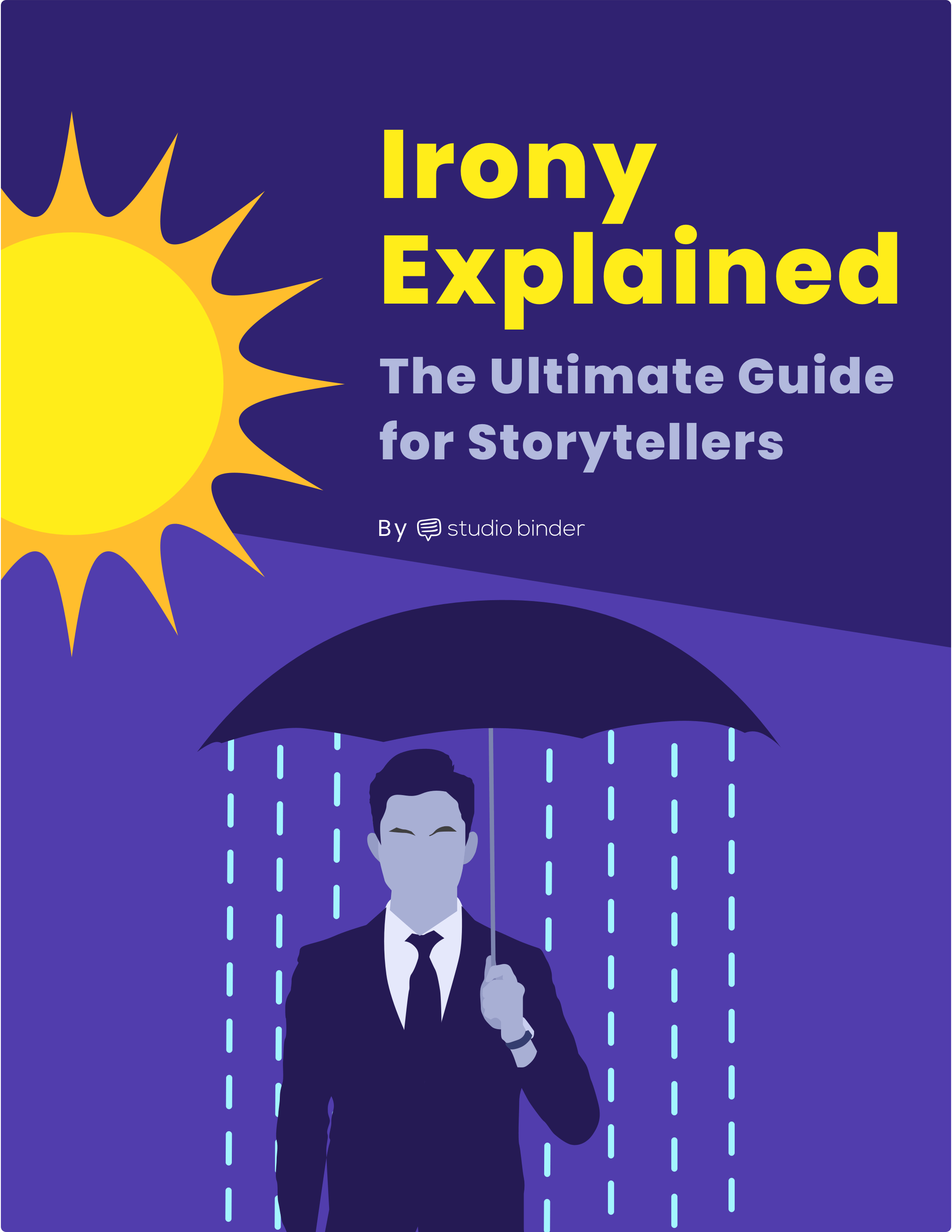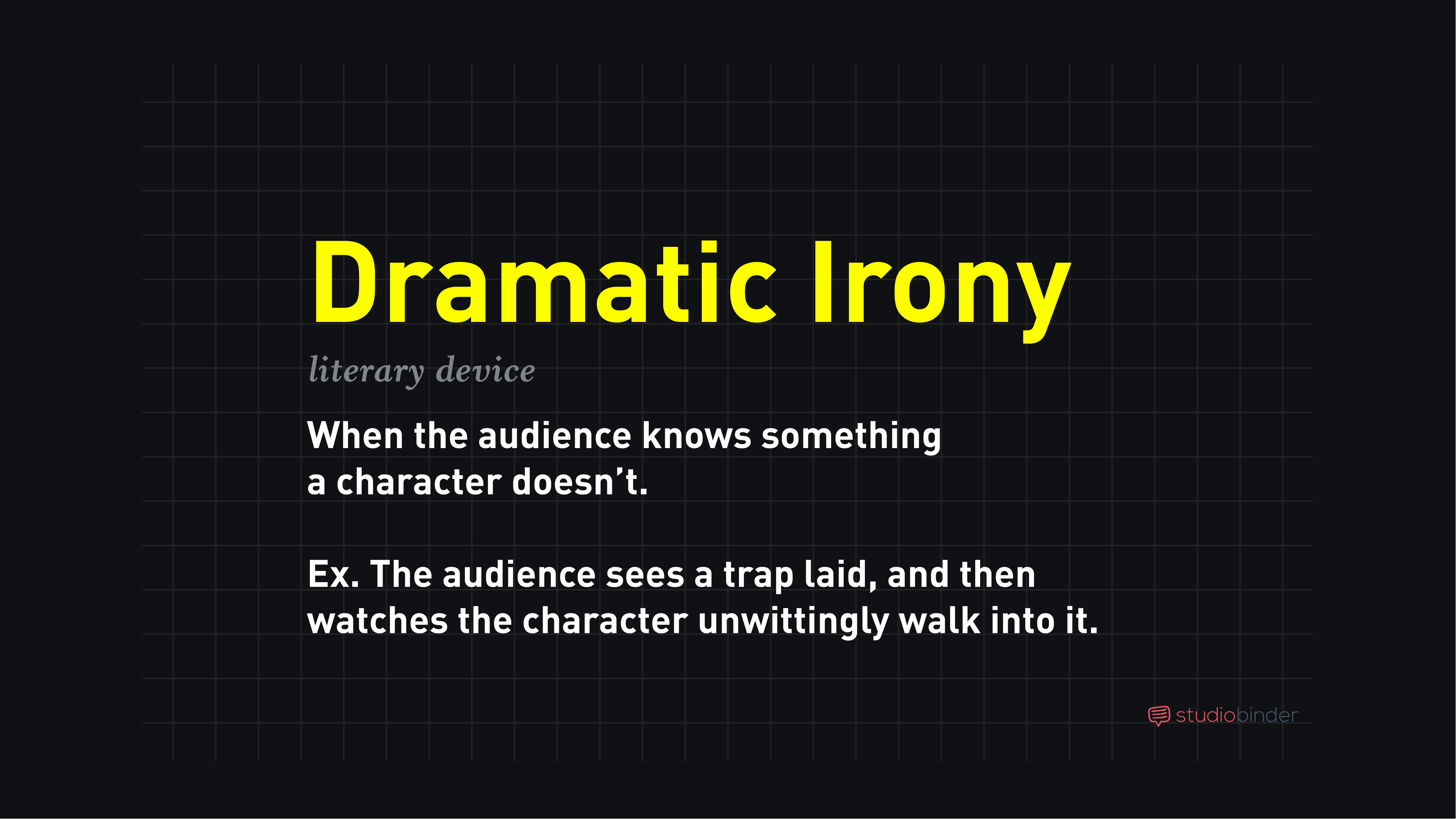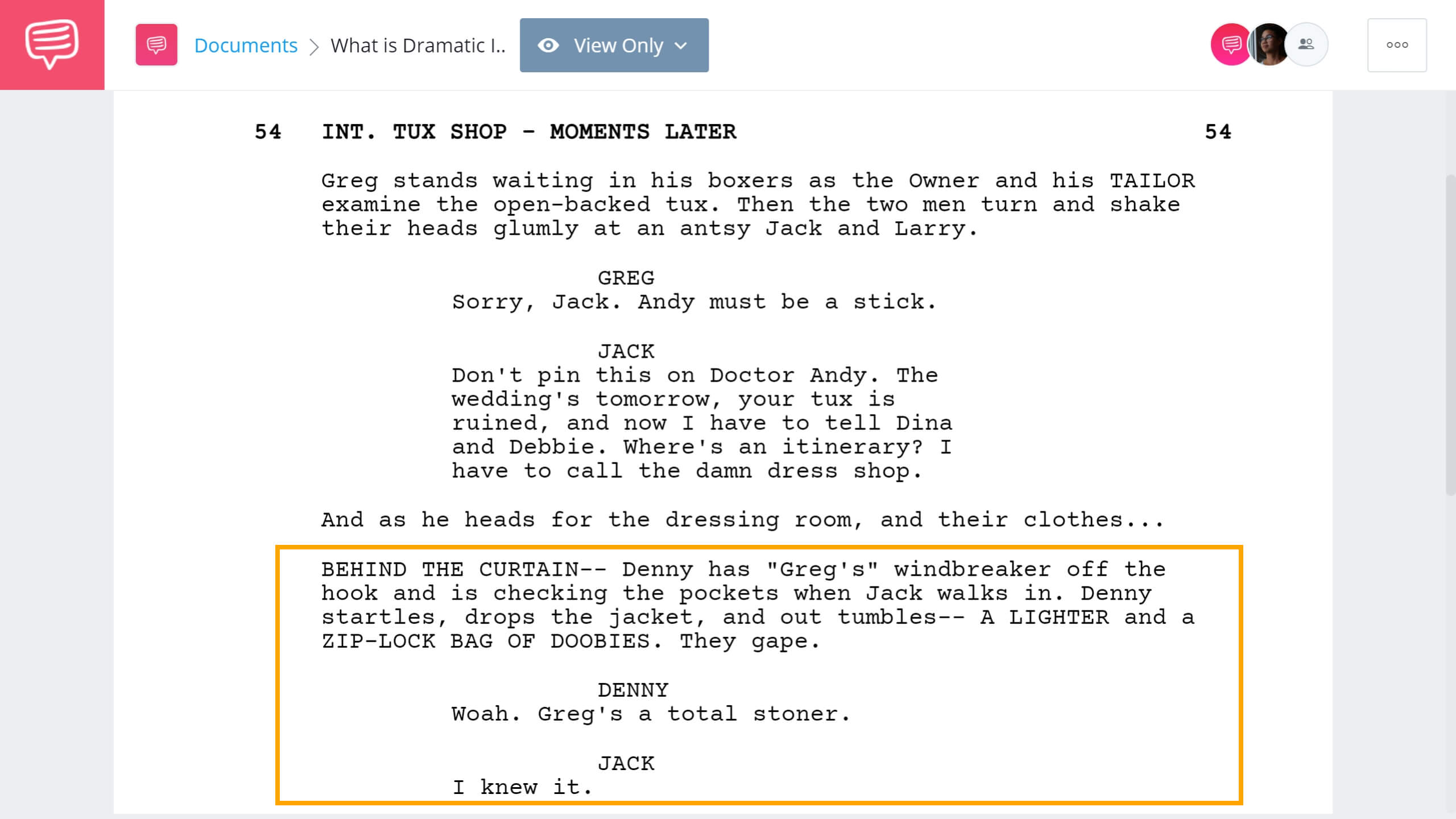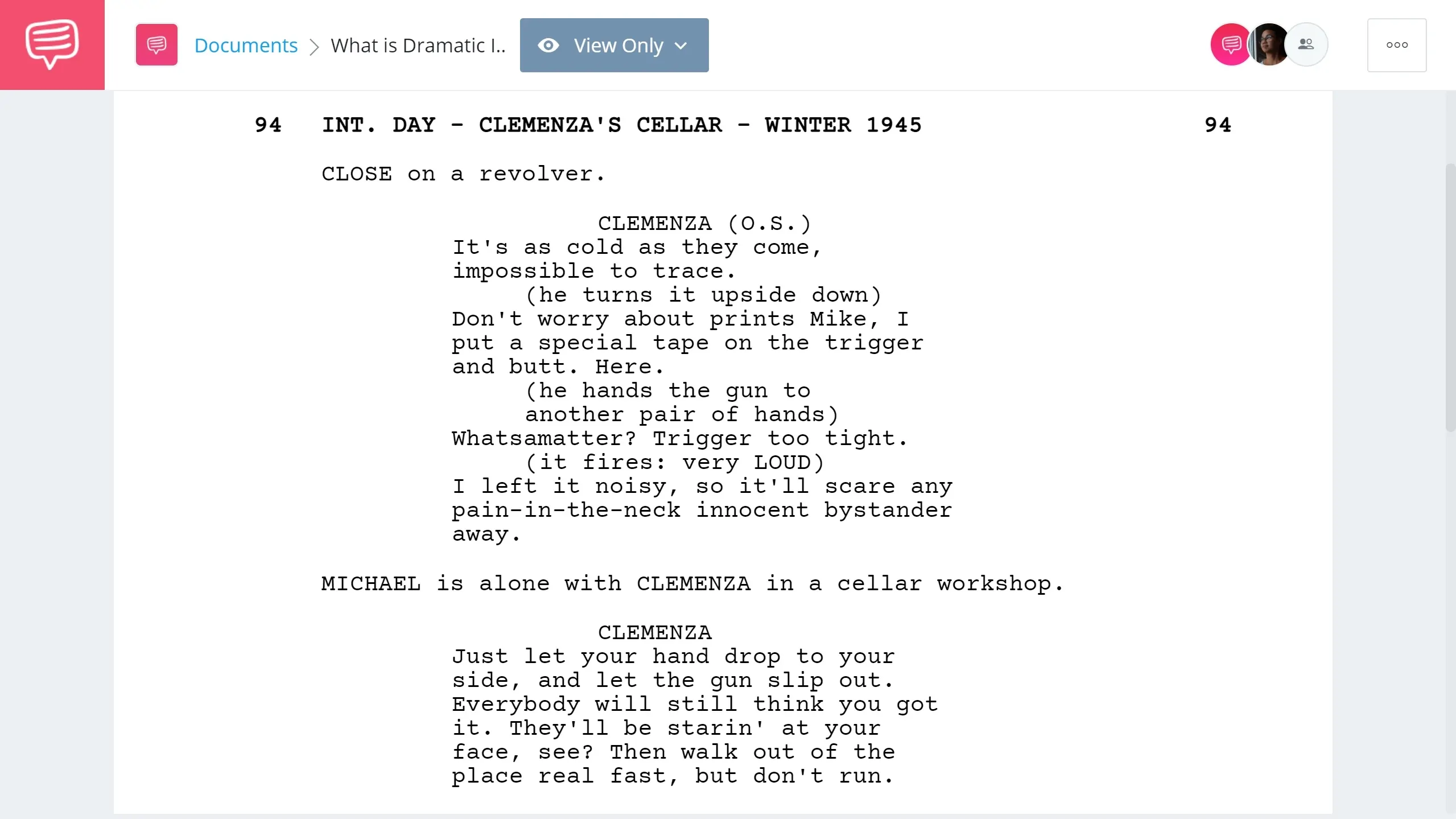Dramatic irony is one of the three main types of irony. Like verbal and situational irony, dramatic irony is an integral element of storytelling. The power a writer or director can yield with a firm grasp of dramatic irony is huge. But what is dramatic irony and how does it work?
In this article, we’re going to define dramatic irony. We will also discuss the stages of dramatic irony and a subtype called tragic irony. By the end, you’ll know how to implement dramatic irony in your own works.
Let’s Define Dramatic Irony Meaning
Introducing dramatic irony
Let’s begin with a quick definition of dramatic irony. Dramatic irony isn’t exactly a difficult concept to understand, but it is difficult to master. In simplest terms: dramatic irony is whenever we’re “in on the secret” of a story.
Dramatic Irony Definition
What is dramatic irony?
Dramatic irony is when the audience understands more about a situation than some of the characters do. Oftentimes, this understanding leads to an element of suspense because we know the character(s) will learn the truth eventually – but we don't know when or how.
Dramatic irony can be deployed in many ways and in many genres. Comedy, horror, suspense, thrillers, and dramas can all benefit from the use of dramatic irony.
What are the stages of dramatic irony?
- Preparation
- Suspension
- Resolution
Dramatic Irony Definition and Examples
What is Dramatic Irony Used For?
Different Types of Irony
Before we go further, let’s clarify how dramatic irony stands apart from other forms of irony. A single narrative, or even a single scene, may use more than one of these types at once.
Dramatic irony vs situational irony
Situational irony is when the opposite of what is expected to happen occurs. Unlike dramatic irony, this doesn’t rely on the audience knowing more than the character.
Take this example of situational irony: It begins raining, and a man runs into a building to stay dry. The building’s roof then caves and the man gets more soaked than he would have outside. This is situationally ironic because it’s the opposite of what we thought would happen. But the audience doesn’t need to know the roof will cave in for it to be effective.
Dramatic irony vs verbal irony
Verbal irony refers to saying one thing but meaning something else. Think of someone flunking a test, and then saying, “I nailed that one.” They’re being verbally ironic. Verbal irony doesn’t need any informational disparity to be effective.
Irony examples
Dramatic irony examples
When the audience knows something the characters don’t, tension is created. We lean in closer and our engagement increases. Of course, for dramatic irony to really be effective, we need to build sympathy for the characters and establish stakes that the audience will care about.
Let’s look at some skillful examples of dramatic irony.
Dramatic irony examples in literature
In Othello, the title character is led to believe his wife cheated on him – but we know she didn’t.
In Slaughterhouse-Five, one of the characters says that they don’t need to worry about Dresden being bombed. With historical hindsight, the reader knows this is in fact untrue.
Fyodor Dostoevsky’s Crime and Punishment revolves around dramatic irony in order to create a sense of paranoia. Our knowledge of the protagonist’s sinister crime makes us paranoid that he’s going to be caught.
Dramatic irony examples in film
In Rope, Brandon and Phillip murder their former classmate David, then host a dinner party. We know David was strangled to death, but the partygoers – who largely consist of his family – do not.
In The Cabin in the Woods, a group of scientists lure five archetypal teens to an abandoned cabin to stage an ancient ritual. We know the five teens are part of a ritual, but they do not.
In The Truman Show, Truman Burbank is unknowingly the star of a 24/7 TV show. We know that Truman is under constant-watch, but he does not.
In all of these stories, the truth is revealed – but the tension that’s created by concealing the “secret” is what drives the story. Now that we’ve looked at some simple examples of dramatic irony, let’s look at how you can create some of your own dramatic irony
Dramatic irony in writing
How to write dramatic irony
The effects of dramatic irony can be seen in any story. Watching a character operate in circumstances where they don't know the entire truth can be dramatic or suspenseful. The best way to learn how to write dramatic irony is by looking at how other writers do it.
Our first example is from one of the best 2000s movies, Meet the Parents. In this scene Jack (Robert De Niro) confronts Greg (Ben Stiller) about smoking marijuana. Of course, we know Jack’s been fed false information. We imported the Meet the Parents script into StudioBinder’s screenwriting software to take a closer look at this scene.
What is Dramatic Irony? • Meet the Parents Example
Now, let’s look at how dramatic irony can build suspense. Breaking down The Godfather script, we can see how Francis Ford Coppola and Mario Puzo used dramatic irony to add tension to this classic scene. Here, we are shown how Clemenza sets Michael up to kill Solozzo and McCluskey.
Dramatic Irony Examples • Laying the Groundwork in The Godfather
Now, we’re effectively “in on the secret.” We know Michael is going to kill Solozzo and McCluskey and we know how he’s going to do it. Sollozzo is (rightfully) suspicious of Michael and pats him down before he goes to the bathroom to retrieve the gun, but there is still a mountain of tension in the scene.
We really feel the effects of dramatic irony here because we know Michael had the gun planted. All in all, it’s a perfect example of how to use dramatic irony from laying the groundwork to execution.
Dramatic irony functions just like suspense: both take time and both need to result in the release of tension. The longer we let the tension boil, the greater the explosive reveal will be.
Now that we've covered what is dramatic irony and how to write it, check out our FREE ebook covering the types of irony, examples, and how writers wield it.
Free downloadable bonus
FREE Download
Ultimate Guide to Irony
Irony is an essential literary device that all writers should master. Download our FREE e-book to get in-depth explanations and examples on topics like the major types and sub-types of irony, and the myriad of ways writers can use it to enrich their storytelling.

UP NEXT
Dive deeper into irony
We've covered the basics of dramatic irony but there is so much more to learn. If there is a particular form of irony you want to explore further, just follow the navigation below. Each one of these subtypes of irony belongs in every writer's toolkit.
Types of Irony
Read a summary of the various types of irony, or dive into the specifics below.



